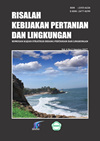ANALISIS KELEMBAGAAN KEMITRAAN USAHA PERIKANAN TANGKAP BERDASARKAN PERATURAN PERUNDANG-UNDANGAN DAN IMPLEMENTASINYA DI KABUPATEN REMBANG
Abstract
Usaha perikanan tangkap senantiasa dihadapkan pada ketidakpastian, sehingga berdampak terhadap keberlanjutan nelayan dalam melakukan penangkapan ikan. Kelembagaan kemitraan dalam usaha perikanan tangkap merupakan salah satu strategi yang perlu diadaptasi masyarakat nelayan dalam menghadapi ketidakpastian tersebut. Kemitraan dalam sistem usaha telah diatur dalam Undang-undang Nomor 20 Tahun 2008 tentang Usaha Mikro, Kecil dan Menengah dan Peraturan Pemerintah Nomor 44 Tahun 1997 tentang Kemitraan. Tujuan penelitian ini adalah menganalisis kesenjangan peraturan perundang-undangan dalam mengatur kemitraan, dan menganalisis tingkat perkembangan kemitraan berdasarkan indikator dalam peraturan perundang-undangan tersebut, serta menyusun strategi kemitraan. Metode yang digunakan dalam penelitian ini adalah analisis hukum meliputi analisis yuridis normatif dan yuridis empiris, serta analisis kerangka logis (LFA). Analisa hukum melalui peraturan perundang-undangan dengan mengungkapkan indikator kemitraan harus memperhatikan aspek pemasaran, pembinaan, permodalan, manajemen dan teknologi. Analisa LFA merekomendasikan penguatan kemitraan usaha perikanan tangkap, melalui (1) membantu akses perbankan; (2) penguatan permodalan koperasi; (3) penguatan peran bakul; (4) revitalisasi Tempat Pelelangan Ikan; (5) intensitas pendampingan teknis penyuluh; dan (6) pembentukan dan intensitas forum KUB.Metrics
Downloads
PUBLICATION ETHICS
Jurnal Risalah Kebijakan Pembangunan Pertanian dan Lingkungan (JRKPL) is a peer-reviewed journal publishing original research to develop a coherent and respected network of landscape architecture knowledge. JRKPL committed to upholding the highest standards of publication ethics that clarifies ethical behavior of all parties involved in publishing a scientific article in JRKPL.
As publisher of JRKPL, PSP3-LPPM IPB and PERHEPI takes its duties of guardianship all stages of publishing process and we recognize our ethical and other responsibilities.
Duties of Authors
An author should not publish manuscripts describing essentially the same research in more than one journal or primary publication. Submitting the same manuscript to more than one journal is unacceptable and constitutes unethical publishing behavior. In general, an author should not submit for consideration in another journal a previously published paper.
Authorship should be limited to those who have made a significant contribution to the manuscript and should be listed as co-authors. Where there are others who have participated in certain substantive aspects of the research project, they should be acknowledged as contributors. The corresponding author should ensure that all co-authors have seen and approved the final version of the paper and have agreed to its submission for publication.
The authors should ensure that they have written entirely original works, and if the authors have used the work and/or words of others, that this has been appropriately cited or quoted. Plagiarism are include passing off another paper as the author own paper, copying or paraphrasing substantial parts of another paper (without attribution) and claiming results from research conducted by others. Plagiarism constitutes unethical publishing behavior and is unacceptable. Plagiarism detected works will be banned for further publication procedure.
The authors acknowledge that they have disclosed all and any actual or potential conflicts of interest with their work or partial benefits associated with it. All sources of financial support for the project should be disclosed. Potential conflicts of interest should be disclosed at the earliest stage possible.
Duties of the Editorial Board
Review Process
JRKPL is committed to objective and fair double-blind peer-review to prevent any actual or potential conflict of interests between the editorial and review personnel and the reviewed material. JRKPL chooses reviewers based on their expertise (whose most closely matches the topic of the paper). At least 2 reviewers are invited to evaluate a manuscript. In cases of controversy or disagreement regarding the merits of the work, an additional review will be solicited. The JRKPL editor mediates all interaction between authors and reviewers, and the review results owned by JRKPL.
Publication Decisions
The editor of a peer-reviewed JRKPL is responsible for deciding which of the articles submitted to the journal should be published. The validation of the work in question and its importance to researchers and readers must always drive such decisions. The final decision on article acceptance based on reviewer's opinions, suggestions, and comments. The editor may confer with other editors or reviewers in making this decision.
Fair Play
JRKPL evaluates manuscripts only based on the intellectual content. No race, gender, sexual orientation, religious belief, ethnic origin, citizenship, or political philosophies of the authors are considered in the evaluation process.
Confidentiality
JRKPL assure the confidentially of the manuscripts, actors, and other related information on the publishing process. Only corresponding author, reviewers, potential reviewers, other editorial advisers, and the publisher are allows for the information.
Disclosure
Unpublished materials disclosed in a submitted manuscript must not be used in an editor's own research without the express written consent of the author. Privileged information or ideas obtained through peer review must be kept confidential and not used for personal advantage.
Duties of reviewers
(1) Objectivity: Reviewer should provide written and unbiased feedback to the authors, personal criticism of the author is inappropriate. Reviewer comments should be clearly with supporting arguments indicating whether the writing is concise and relevant
(2) Expertise: Reviewer who feels unqualified to review the research reported in a manuscript or knows that its prompt review will be impossible should notify the editor and excuse himself from the review process.
(3) Acknowledgement of sources: Reviewer suggest relevant published work that has not been cited by the authors to improve the quality of the manuscript,
(4) Confidentiality: Reviewer should maintain the confidentiality of the review process. Privileged information or ideas obtained through peer review must be kept confidential and not used for personal advantage.
(5) Disclosure and conflict of interest: Unpublished materials disclosed in a submitted manuscript must not be used in a reviewer own research without the express written consent of the author. Reviewers should not consider manuscripts in which they have conflicts of interest resulting from competitive, collaborative, or other relationships or connections with any of the authors, companies, or institutions connected to the papers.


















